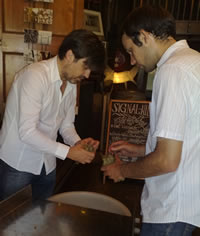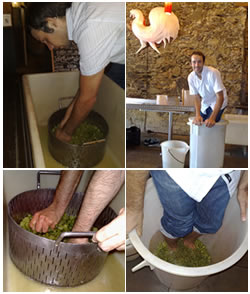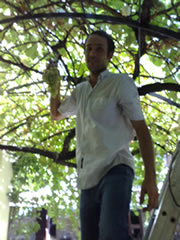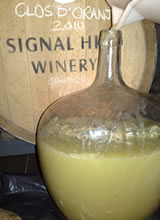Tucked away in the beautifully restored 18th century town houses of Heritage Square you will find the oldest fruit baring vine in the Southern Hemisphere. No one would have thought that wine can still be produce from this old vine, but thanks to the love and care of Kyle Zulch, the winemaker and co-owner at SIGNAL HILL Winery, the vine has been restored to it’s natural glory. The vine was almost destroyed by powdery mildew but today this beautiful old Crouchen Blanc vine can produce about 20 liters of wine.
In a journal that dates back to 1785 the first landlord of the town houses wrote “Drinking wine under the grape tree”. It’s estimated that the vine was probably planted in 1771.
In order to restore the vine, Kyle had to prune and shape the vine and due to late budding the production might be a bit less than expected. There was a lot of dead wood on the vine which caused concern, but Kyle believes that the vine will be back to perfect condition in about 3 years time. Only organic fertilisers and fungicides was used on the vine. Some fungus and milldew developed on the vine just before harvesting due to late evening mist and uneven ripening also occurred. It took a lot of energy and hard work to get the vine back in shape but Kyle believes that it’s worth every drop of sweat and sees it as an investment for the future.
So how do they know when the grapes are ready to be harvested? There are two signs:
- Once the birds are starting to eat the fruit it’s ready to harvest.
- If the colour of the pip is brown it’s also ready to harvest.
The last grapes was harvested on a hot Thursday morning and was ready for shorting.
Sorting the grapes
The grapes were hand shorted in order to prevent any rotten and sunburned grapes from slipping through. Some wineries make use of chemicals that prevents the grapes from rotting, but SIGNAL HILL winery doesn’t. Owner, Jean Vincent Ridon, believes in  making natural wines and says that we in South Africa can still afford to de-stem the grapes by hand which gives us the edge over the rest of the world.
making natural wines and says that we in South Africa can still afford to de-stem the grapes by hand which gives us the edge over the rest of the world.
The team at SIGNAL HILL Winery also believes that whatever goes out of a vineyard must go back in. Every single stem and rotten grape are processed at their earthworm farm which is situated in Camps Bay. They are very concerned about their impact on the terroirs and in order to reduce the effect of the global warming, and to support a sustainable future, SIGNAL HILL winery is using recycled glass bottles only, which are supplied by Green Bottles Recyclers.
Crushing the grapes and fermenting the juice
 Once all the grapes have been shorted and de-stemmed it’s time to get the juice out. Kyle has no problem when it comes to getting his hands and feet sticky and stomped the grapes with great passion and soul.
Once all the grapes have been shorted and de-stemmed it’s time to get the juice out. Kyle has no problem when it comes to getting his hands and feet sticky and stomped the grapes with great passion and soul.
Once all the juice is squeezed out of the fruit it’s poured over into a demijohn, a small glass container that they use to ferment the wine in. They make use of a demijohn because they can control the fermentation process better and produce a higher quality wine. They have to be careful for light, seeing that the container is see through and they make use of brown paper to wrap and cover the bottle. The wooden seal at the opening allows gas to go out and prevents oxygen from entering the bottle.
The juice will start fermenting in the bottle and because it’s a small quantity it will take about 1 week to ferment. They only add natural yeast to the wine and no cultivated yeast. The fermentation process is over once the wine stops bubbling.
Once the wine has fermented it will be bottled and will stay in the bottles for about 6-8 months. The 1771 wine will be auctioned off at a gala event and all proceeds will go to charity.
SIGNAL HILL Winery can well be called Cape Town’s Winery. They cater for a niche market and have a close connection with their customers. They have truly brought South African wine making back into the city of Cape Town, the place where it all started 240 years ago.






